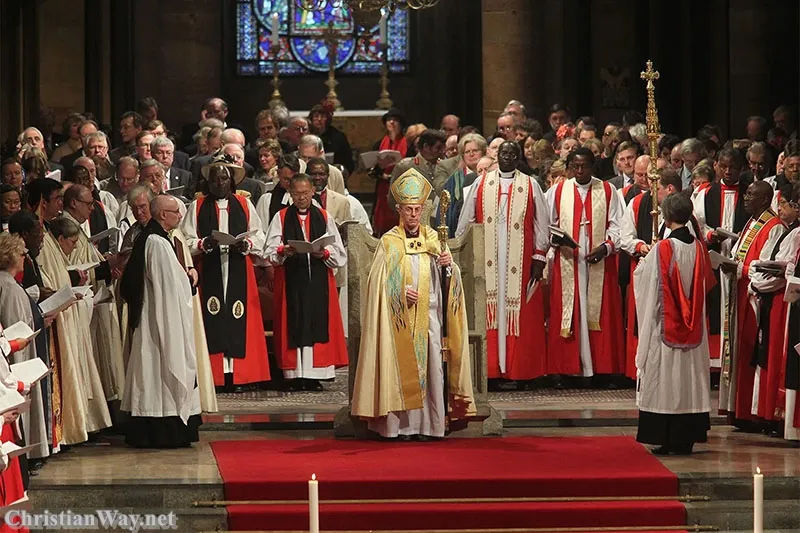Dear friends in Christ,
Every generation of believers must learn anew what it means to follow Christ — not simply in words, but in the deep formation of the heart. In the Anglican tradition, the Catechism serves this very purpose: to teach, to remind, and to root Christians in the life of faith that leads to holiness. It is not merely a set of questions and answers, but a gentle guide into the mystery of grace, helping the faithful to know what they believe, why they believe it, and how that belief transforms the way they live.
In every era of the Church, catechisms have stood as beacons of spiritual instruction — concise yet profound, intellectual yet pastoral. The Anglican Catechism, drawn from Scripture, tradition, and the historic witness of the Church, continues this sacred task. It forms disciples, strengthens families, and anchors the Church in the faith once delivered to the saints.

Let us walk together through the meaning and purpose of the Anglican Catechism, to see not only its structure, but its beauty — for within its pages lies a path of encounter with the living Christ.
The Meaning and Purpose of a Catechism
The word “catechism” comes from the Greek katecheo, meaning “to instruct” or “to echo.” In the early Church, catechumens — those preparing for baptism — were “echoing” the Word of God as they learned the truths of faith. This practice was not about rote memorization but about echoing the Gospel in the heart, until the believer could say with conviction, “I believe.”
The Anglican Catechism follows this same ancient rhythm of instruction. It teaches through dialogue — question and answer — forming not just the mind but the soul. It is used to prepare candidates for baptism and confirmation, to guide families in faith, and to renew understanding in adults who wish to deepen their discipleship.
At its core, the Catechism answers three great questions that all Christian hearts must face:
- What do we believe?
- How are we to live?
- How do we pray?
Each of these questions unfolds through Scripture and tradition, leading us from knowledge to worship, from creed to compassion, from faith to action.
The Historical Roots of the Anglican Catechism
The roots of the Anglican Catechism reach back to the Book of Common Prayer (1549), shaped under the guidance of Archbishop Thomas Cranmer. Cranmer, drawing upon the early Church Fathers and medieval English liturgical tradition, sought to form a Church that was both catholic and reformed — faithful to the historic creeds and Scriptures, yet renewed by the Gospel’s simplicity and power.
The original catechism, included in the Book of Common Prayer (1552) and later revised in 1662, was concise and direct, addressing the foundational elements of Christian faith:
The Apostles’ Creed, The Ten Commandments, and The Lord’s Prayer.
This structure was intentional. It reflected the threefold path by which the Church has always formed disciples: faith, obedience, and prayer.
Over time, Anglican provinces have expanded or adapted the Catechism to meet pastoral needs. Modern versions — such as An Outline of the Faith in the 1979 Book of Common Prayer of the Episcopal Church, or To Be a Christian: An Anglican Catechism (2014) from the Anglican Church in North America — seek to present the timeless truths of faith in language accessible to today’s believers.
Yet the heartbeat remains the same: to teach Christ in all things.
The Structure of the Anglican Catechism
The traditional Anglican Catechism is simple yet profound, reflecting a theology of formation that moves from identity to practice.
1. The Baptismal Covenant — “Who Are You?”
It begins with identity: “What is your name?” and “Who gave you this name?” — pointing to the sacrament of Baptism, where the Christian receives both name and grace. Baptism is the gateway to life in Christ, the beginning of the believer’s story.
The Catechism thus reminds us: before we believe, we are beloved. Our faith is a response to God’s initiative — a covenant of love.
2. The Apostles’ Creed — “What Do You Believe?”
The Creed stands at the center of the Catechism, declaring the heart of Christian faith: belief in the Father, the Son, and the Holy Spirit. The Anglican tradition holds firmly to this creed, not as a formula but as a living confession. Each line of the Creed proclaims the mystery of God’s work — creation, redemption, and sanctification.
To recite it is to take one’s place in the communion of saints across all ages and nations.
3. The Ten Commandments — “How Shall You Live?”
Faith, if genuine, must shape conduct. The Ten Commandments provide the moral framework of Christian life — not as burdens, but as gifts of freedom.
The Catechism presents each commandment with explanation, showing how divine law leads to human flourishing. The moral vision is one of love: love of God and love of neighbor.
4. The Lord’s Prayer — “How Shall You Pray?”
Finally, the Catechism teaches prayer — for faith without prayer is lifeless. The Lord’s Prayer, given by Christ Himself, forms the rhythm of Christian devotion.
Each petition — “Hallowed be Thy Name,” “Thy Kingdom come,” “Thy will be done” — draws the heart into union with God’s will. It is the prayer that teaches us to desire what God desires.
The Catechism as Spiritual Formation
The Anglican Catechism is not simply a text for instruction; it is a school of the soul. It teaches us to think, to believe, to love, and to live as followers of Christ.
Through its questions and answers, believers learn the rhythm of faith: hearing, responding, and embodying the Word. It is deeply pastoral, for it speaks to all ages — from the child preparing for baptism to the adult seeking renewal of faith.
This form of catechesis emphasizes relationship over information. Its goal is not intellectual mastery but spiritual transformation — to bring each believer into deeper communion with Christ.
St. Augustine once said, “You have made us for Yourself, O Lord, and our hearts are restless until they rest in You.” The Catechism helps the heart find that rest — teaching the truths of faith not as abstract doctrine, but as the living story of God’s love for His people.
The Catechism and the Sacramental Life
In the Anglican view, the Catechism is inseparable from the sacramental life of the Church. It leads the believer toward participation in Baptism, Confirmation, Eucharist, and the daily disciplines of grace.
It teaches that faith is not merely confessed, but lived and celebrated in the sacraments — where divine grace meets human response.
Each answer in the Catechism points beyond itself to the altar, to prayer, and to service. It prepares the Christian not just to know about God, but to live in God.
When a child is confirmed, the Catechism becomes the foundation of their “yes” to God’s call. When an adult returns to the faith, it becomes a lamp to rediscover what was always true. And when a community gathers around it in study, it becomes a shared language of faith and unity.
The Modern Catechisms: Renewal for Today
In the modern Anglican world, several versions of the Catechism are in use. While each reflects its own theological and pastoral context, all remain rooted in Scripture and the ancient creeds.
- “An Outline of the Faith” (1979 BCP, Episcopal Church):
Organized in question-and-answer form, it covers creation, sin, redemption, the Church, ministry, and the sacraments — emphasizing God’s grace and the believer’s call to love. - “To Be a Christian: An Anglican Catechism” (2014, ACNA):
A more comprehensive text, it seeks to form mature disciples, integrating doctrine and devotion. It reflects a renewed emphasis on biblical grounding, Trinitarian faith, and moral clarity.
Though written centuries apart, both catechisms echo one truth: that Christian faith is not a theory but a life lived in communion with God.
The Catechism in Daily Life
The Catechism finds its fulfillment not in classrooms, but in life itself. It is meant to be prayed, lived, and shared. Parents use it to teach children; clergy use it to prepare catechumens; individuals use it to examine their hearts before God.
It encourages a rhythm of faith that holds Scripture, prayer, and obedience together — reminding the believer that Christian life is a daily conversion.
In an age of spiritual confusion, the Anglican Catechism offers clarity without rigidity, depth without pride, and tradition without fear. It helps Christians live with conviction and grace in a world that often forgets what it means to believe.
The Ecumenical Value of the Anglican Catechism
While deeply rooted in Anglican identity, the Catechism holds ecumenical significance. Its structure mirrors the catechetical tradition shared across the Christian world: Creed, Commandments, and Prayer.
Thus, it can serve as a bridge of understanding among Catholic, Orthodox, and Protestant Christians — a reminder that before denominational differences, there is a common confession of faith.
In a divided age, such shared foundations remind us that the Church’s mission is one: to proclaim Jesus Christ, crucified and risen, to the world.
A Living Faith for a Living Church
To study the Catechism is to enter into the heartbeat of the Church’s faith. Its questions are ancient, but its answers remain ever new.
When we speak its words, we join a chorus that spans centuries — a song of faith that begins in the waters of Baptism and continues into the life everlasting.
The Catechism’s wisdom lies not in complexity but in simplicity. It calls us to remember who we are: God’s children, redeemed by grace, called to live in love.
Reflect and Pray
Beloved in Christ, the Catechism is not a relic of the past but a lamp for our path. In it, the Church whispers again the truths that do not change: God loves you, Christ has redeemed you, and the Spirit is with you.
May the study of the Anglican Catechism renew in us the joy of belonging — not just to a Church, but to the Body of Christ. May it form our hearts to say with all believers, “I believe and trust in God the Father, God the Son, and God the Holy Spirit.”
Let us pray:
Lord Jesus, You are the Teacher of truth and the Shepherd of souls.
Form our hearts by Your Word and our lives by Your grace.
As we study the faith we profess, let it not be mere knowledge,
but a living flame that draws us nearer to You.
Strengthen us to live what we believe and to love as You have loved us.
Amen.
— Fr. John Matthew, for Christian Way





